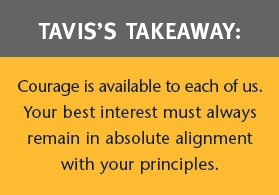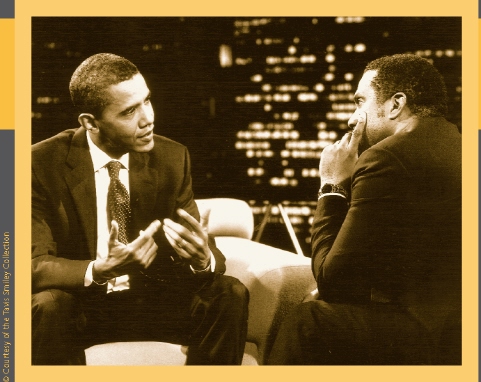Fail Up (24 page)

“No one should be elected president of this country in 2008 if they think that along the way they can ignore people of color. If you want to be president of all of America, you need to speak to all Americans.”
My criticisms weren't partisan; they were principled and carried a consistent message:
Don't ever let the power of anyone's personality trump your principles.
Standing on Shallow Ground
On March 1, 1848, British statesman Henry John Temple delivered an inspiring phrase in a speech before the House of Commons:
“We have no eternal allies and we have no perpetual enemies. Our interests are eternal and perpetual, and those interests it is our duty to follow.”
Somehow, when promoting the CBC's adaptation, I failed to note the altered endings.
CBC:
“We have no permanent friends, no permanent enemies,
only permanent interests.”
Temple:
“Our interests are eternal and perpetual, and those
interests it is our duty to follow.”
If I had drilled deeper, perhaps I would have realized that I was clinging to a shallow and hollow statement. It's endemic of what's wrong with our society: Everybody's dancing to the “what-have-you-done-for-me-lately” beat. But those who adopt shallow and hollow positions wind up having shallow and hollow lives. My failure was that I promulgated a philosophy that I had not wrestled with enough. It wasn't until Dr. West challenged me to dissect the words that I realized I was just using a slogan to motivate Black people to keep moving forward, making progress, and getting things done. It was a handy motto, but it was still a slogan. And slogans are not solutions. Slogans are untethered; we need to be grounded in our principles.
All too often in our society, we consider slogans and sound bites as being good enough. In fact, entire political campaigns have been built around simplistic sound bites. But in a world of one-liners, we have to make sure our phraseology actually means what we intend for it to mean. For instance, there's a whole political movement revolving around the quip “we have to take our country back.”
What does that really mean?
If you really drill down, the slogan demands actionâmaybe even unsavory action. One has to answer
who
took their country in the first place. More important, they have to decide to what extremesâpolitically or personallyâthey will go to in order to take their country back.
In other words, sound-bite politics can lead to unsound policy or unsafe practices.
Principles at a Price
I do not believe it's an overstatement to say that the weakened and suspect state of most media outlets is a result of its wholesale abandonment of principles. No doubt, the institution can point to a laundry list of economic and technological challenges, but it cannot boot the loss of public trust into any other camp but its own. Millions of lives might have been spared had mainstream media not buckled to post-9/11 sentiments and fully challenged former President George W. Bush's distorted reasons for invading Iraq. The Fourth Estate had an obligation to ostracize the FOX News powerhouse that altered traditional journalistic objectivity with steady streams of biased, partisan opinions and slanted news coverage.
Mainstream media mostly folded to market forces. Many large media outlets cut international coverage and in-depth investigations because they were too costly or they turned off readers, listeners, and viewers desperate for personality-driven news that validated their staid perceptions without challenge. The entire world, I maintain, has been weakened because basic media principles have been compromised.
Dr. King did not follow a “just permanent interests” philosophy. His interests were not negotiable or interchangeable. In his 1957 speech, “Give Us the Ballot,” he indicted those he felt had abandoned their principles in the fight for equal voting rights:
“The Democrats have betrayed it
by capitulating to the prejudices and undemocratic
practices of the southern Dixiecrats. The Republicans
have betrayed it by capitulating to the blatant hypocrisy
of right wing, reactionary northerners. These men
so often have a high blood pressure of words
and an anemia of deeds.”
Truth based on immutable and unshakable principles will always rise. Or as Dr. King, quoting William Cullen Bryant, said, “Truth crushed to earth will rise again.”
Ultimately, we Americans are to be blamed for the way corporations, major media outlets, politicians, or political parties serve us. Without unshakable principles and standards, we become easy targets for exploitation. Popularity should never trump the will of the people. If we were truly committed to objective, uncompromised journalism, “fair and balanced” would be more than a meaningless slogan. If we really believed in a more just and equitable society, we would reject shallow and hollow mandates.
Sometimes what's in your best interest is absolutely aligned with your principles. Sometimes not. In these moments, we have to dig deep and remember the principles on which we are trying to build our lives. Make no mistake about it, if you commit to stand on your principlesâlike truthâthe forces will try to crush you. Principles come with a price.


WHEN EVERYBODY
TURNS AGAINST YOU
M
y tears splattered on the eight-page, single-spaced, typed letter. With each line a rip widened in my heart. The sender is celebrated around the world, yet I have the privilege to call her “friend.” She's the last person from whom I expected this.
“Your spirit and your soul are out of alignment with God,” she wrote.
The letter was, at least, compassionate. For months, hundreds of other notes, e-mails, calls, and news stories contained much more indicting, critical, and often life-threatening comments:
“Your ego has blinded you ⦔
“You are a sellout and a traitor to your race!”
“Smiley is a disservice to the community.”
“Who died and made Tavis king? ⦔
Most of those missives poured in around February 2008. By then, candidate Barack Obama, U.S. Senator from Illinois, was emerging as the front-runner for the Democratic presidential nomination. Some of my commentaries on the
Tom Joyner
Morning Show
criticized the candidate who seemed hesitant to discuss issues of specific concern to people of color. I encouraged our audience not to give the candidate a pass based on his skin color. Hold him just as accountable as we would any white candidate, I exhorted.
In late March, news spread that I was leaving Tom's show. The assumption was that pushback from Obama's angry supporters had sent me over the edge. In a statement on his show that caught me totally by surprise, Tom said I had “quit” because I couldn't “take the hate” from listeners incensed about my comments.
“People are really upset ⦠he's always busting Barack Obama's chops. They call. They e-mail. They joke. They threaten. You know Tavis like I do. He needs to feel loved.”
There was a lot of hate, some threats, and many insane accusations such as my punishing Obama for skipping my “State of the Black Union” forum. Another echoed the claim that I was “buck dancing” for candidate Hillary Clinton.
According to one commentator, the heat I generated in the kitchen was too much for me to bear: “For a long time, Tavis was used to people applauding him for taking tough stances ⦠This was the first time he had taken a position that flat-out ticked off his core audience. But [criticism] comes with the territory.”
The commentator must have missed my debut on BET. As I noted earlier, viewers definitely brought the heat after my very first interview with Russell Simmons. It took about two years to remove the boulder he placed on my shoulder when he called me a “house nigga.” It took hip-hop fans a long time to stop sending angry and threatening letters, to cease showing up at public events to challenge me, and to remove the stigma attached to me, unjustly, by Simmons.
No, I can take the heat. The speculators couldn't have been more wrong.
What did sting, however, was that my years of service and my particular love for Black people seemed to have been ignored or forgotten. In reality, my position on Obama was not unlike any I had taken with presidential candidates or other politicians over the years. Frankly, this period was one of the most heated and hurtful of my entire career.
Here again, my stance wasn't personal; it was principled.
What also caused me enormous sorrow were the admonitions and warnings from colleagues, members of my staff, family, and dear friends, like the author of the eight-page letter.
Her rationale for sending it stays with me. She explained how everywhere she wentâthe beauty shop, the airport, or anywhere on the streetâeverybody was saying that I was wrong. She closed with an argument that, I suppose, indicated my misalignment with God: “Tavis, when everybody you know is pushing back, it's time to check your ego.”
Where Did It Go Wrong?
It's one thing to encourage people to find their truths, stand on principle, and adhere to the three C's (courage, conviction, and commitment) when tested. But that's a hard lesson to enact when everybody you know, love, and respect is saying you're wrong.
“The unexamined life is not worth living.”
âSOCRATES
Much of my time during that most difficult period was dedicated to re-examining my reasoning, dissecting my motives, and challenging my ego. I reread every word I had ever spoken or written about Barack Obama.
Did I ever say anything to demean or disrespect him? No. Did I ever encourage voters to support his opponent? No. Did I want him to win? Yes. Do I want him to be a great President? Again, yes! I just don't like seeing Black folk ignored or taken for granted.
Perhaps, I thought, if I carefully scrutinized my record, I'd discover the radical point of departure from that which had shaped my career.
When I signed on to work with Tom Joyner in 1996, my goal was to not only make listeners think but also to find ways to move people into action mode. With a national audience of millions, we had a decent shot at creating a massive coalition of change agents.
With listener participation, we had successfully championed many causes in those first few years. Shortly after starting with Tom, I joined BET as a television host. I then had the opportunity to do double whammiesâTV and radioâon certain issues and causes.
Creating, promoting, and adopting an agenda of action became my focal point. The annual “State of the Black Union” symposia, with the best and brightest minds, put us on a path to advancing a policy agenda for sustainable and positive change.
In 2006, we published the
Covenant with Black America
. It hit the #1 mark on
The New York Times
best-seller list. A year later,
The Covenant In Action
âan NAACP Image Award Winnerâreached the #7 spot on the same prestigious list.
After countless radio and TV conversations, book tours, and seminars revolving around the
Covenant
books, we had thousands committed to action, armed with agenda items, corroborating statistics, bullet-point demands. We had everything we needed to barter with any established or prospective politicianâDemocrat or Republicanâwho desired our votes.
In 2007, we hosted not one, but two primetime television presidential debates on PBSâone for Democrats, at Howard University, and another for Republicans, at Morgan State University. They were the first nationally televised debates where presidential candidates exclusively addressed issues important to people of color. They were also the first that people of colorâme, as moderator, and the panelists posing the questionsâcontrolled.
By the time President Bush started his second term, we were a well-oiled machine. We knew he was on his way out and the 2008 election was going to be the mother of all elections. Our intent was to use our momentum to force candidates to address the disparities in employment, health, education, the crippling prison industrial complex, and moreâeverything outlined in the
Covenant with Black America.
